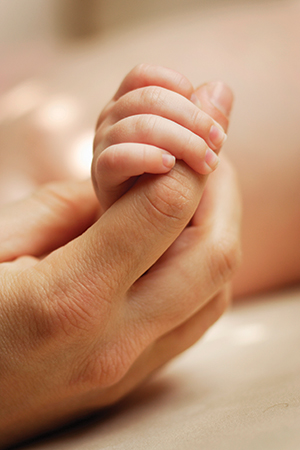Many parents are concerned about the issue of phthalates (a group of chemical compounds used in plastics and as fragrance stabilizers) and their alleged health effects on children.
The monthly journal Pediatrics published results of a study done in Seattle that analyzed urine samples from 163 infants for the presence of phthalate metabolites. The results indicated that many common baby-care products (lotions, shampoo, powder) may be to blame. The researchers found the presence of at least one phthalate metabolite in every urine sample, while 81% of the samples had measurable amounts of more than one phthalate. Infants exposed to multiple products tended to have the highest level of phthalate metabolites in their urine, suggesting that the products may be to blame. Since phthalates are used in many fragrances (and most baby products are heavily fragranced, often more so than skin-care products aimed at adults) it was natural to assume that this multiple fragrance exposure via topical application was the culprit.
Interestingly, the lead researcher on the study had only poor advice for parents: use baby-care products less often or only if deemed medically necessary. How practical is that? A far better directive would be to instruct parents to shop for fragrance-free baby-care products, and demand that companies not offering such options do so for the health and safety of their children. Why that wasn’t even hinted at by the researchers behind this study is very frustrating.
The Personal Care Products Council (formerly the Cosmetics, Toiletries, and Fragrance Association) issued a rebuttal to the study in Pediatrics, stating that the results “do not make sense because only one of the seven phthalate compounds reported is even used in baby care products. This suggests that most of the phthalates found in the urine samples came from another route of exposure…” The phthalate that is used in fragrances added to baby-care products is diethyl phthalate (DEP). Interestingly, several cosmetic ingredient advisory boards, including the stringent Scientific Committee on Consumer Products (which advises regulatory boards in the European Union) have deemed DEP to be safe as used. An exhaustive evaluation of the research on this chemical has not shown it to be a reproductive toxin or endocrine disruptor.
The Personal Care Products Council also pointed out that the researchers responsible for this study did not test any baby-care products for the presence of phthalates (they only examined urine samples) and did not account for other potential means of exposure. All of this points to a study that, while intriguing as a sensationalized headline, isn’t reason to stop using baby-care products or worry that your child is going to suffer adverse health effects.
Whether or not phthalate exposure at any age causes long-term health problems in humans is suspected but not unequivocally confirmed. Scientists studying these ingredients point out research on animals that has shown links to reproductive and developmental toxicity resulting from phthalate exposure.
Sources for the above: www.reuters.com; www.personalcarecouncil.org; and Molecular Nutrition and Food Research, July 2007, pages 899-911.

